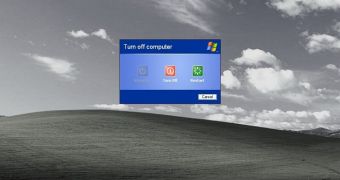Staying on Windows XP right now isn’t quite the smartest thing to do since the parent company no longer releases updates and security patches for this particular OS version, but no less than 28 percent of the desktop PCs worldwide are still running it.
The security risks of using Windows XP after end of support are enormous, Microsoft, partners, and experts across the world have warned, but that doesn’t seem to matter too much for a number of users.
The only way to make sure that no vulnerabilities will be discovered is to complete eradicate Windows XP, TK Keanini, CTO of Lancope, said in an interview with TechRepublic, explaining that no security solution or workaround could keep you complete safe and away from potential hacks.
“XP, on the other hand, has stopped evolving and any vulnerability discovered from April 8, 2014, into the future will remain a danger to everyone connected to the Internet. The only solution for XP at this point is to make it go away -- rid it from existence. Everyone needs to do their part to get rid of it, because if we don't, in this connected world, it will ultimately be a bad thing for everyone,” he said.
Microsoft said pretty much the same thing, explaining that although many security apps out there will continue to run on Windows XP for many months from now, none can guarantee that you’re fully protected.
In fact, Microsoft itself removed the download links for Security Essentials with Windows XP support, so if you’re looking to get its own anti-virus for an XP machine, you can’t do it right now unless you know where to look.
Existing installations of Security Essentials on Windows XP will continue to receive updates just fine, Microsoft said, so new virus definitions will still be offered to computers running it right now.
“Microsoft provided support for Windows XP for the past 12 years. But the time came for us, along with our hardware and software partners, to invest our resources toward supporting more recent technologies so that we can continue to deliver great new experiences,” the software giant said.
Upgrading to a newer OS version, such as Windows 8.1, is basically Microsoft’s preferred option for Windows XP users, but such a migration also involves more costs, as old computers cannot cope with the requirements of a modern operating system that comprises many more features than the old XP.

 14 DAY TRIAL //
14 DAY TRIAL //